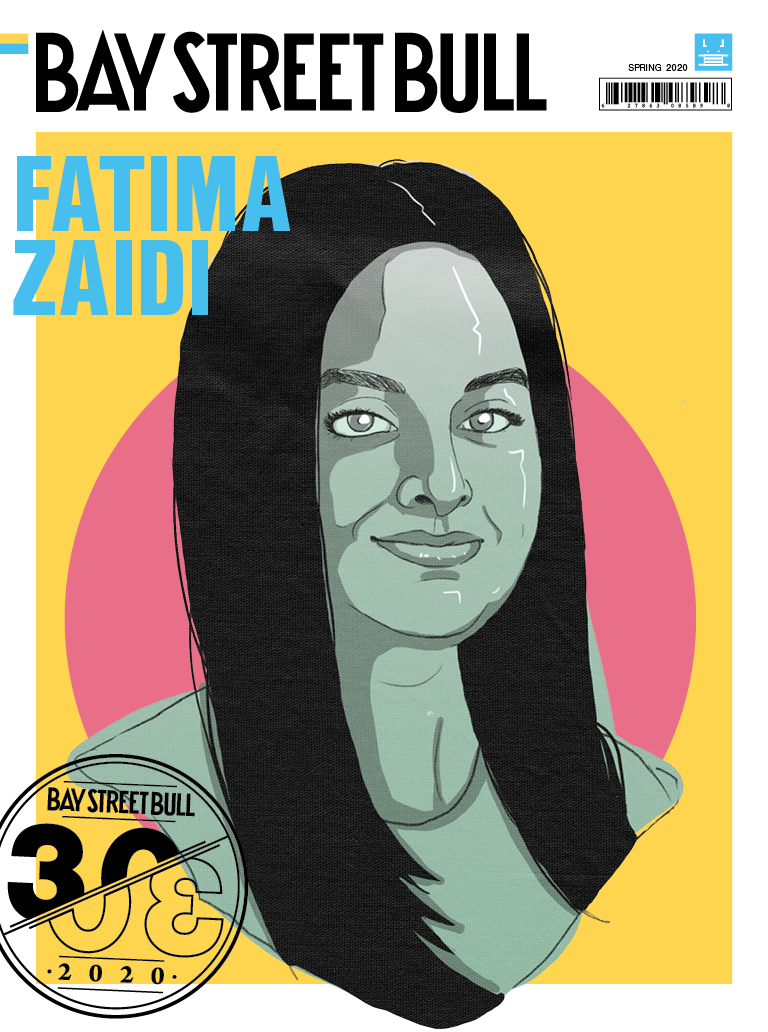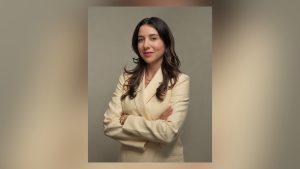[vc_row][vc_column][vc_separator color=”black”][vc_column_text]According to Podcast Insights, there are currently over one million podcasts on the digital airwaves right now, and over 30 million episodes available for listeners to digest as of April 2020. With advertising revenue expected to surpass one billion by 2021, it’s clear that we’re in the midst of a podcast boom right now.
Seeing an opportunity to capture an emerging market, Fatima Zaidi created Quill, the world’s first one-stop marketplace where podcasters can find the resources and talent to build their podcasts and grow an audience. Headquartered in Toronto, Quill, comes at a pivotal time where brands are looking to nurture deeper relationships with their consumer base while reaffirming their expertise on subject matter at the same time.
With a new and rapidly-growing market ahead of her, Zaidi’s journey as a new entrepreneur is just getting started. For this week’s Women Who Lead spotlight, from this year’s 30×30 guide, the Bay Street Bull spoke with Zaidi about cultivating potential and supporting creatives in creating.[/vc_column_text][vc_separator color=”black”][vc_column_text]What is Quill, and why did you decide to start it?
Quill is the world’s first marketplace for podcasters. If you are an indie podcaster or a company looking to start a new podcast, or outsource elements of your existing show, we’re your one-stop shop. People can go onto our platform and find a range of different freelancers that are vetted experts by us who have a lot of experience in the podcasting industry. They come at different price points so they’re very affordable and you can hire them for audio editing, production, transcription, logos—whatever services that you might need associated with your podcast. I’m a big consumer of podcasts and I saw a gap in the market about a year and a half to two years ago, and eventually decided to move into this space.
There has definitely been a proliferation of podcasts. Where do you think that this uptick in podcasting came from?
Given everything that’s happening with COVID-19, people want to stay connected and I think podcasting is just such a great medium for that. If we go back, 2014 is when podcasts started becoming mainstream and it could be for various reasons. The launch of Serial really helped with [host] Sarah Koenig. It was a really great podcast and kept people on the edge of their seats. People realized that narrative storytelling can be told through audio and still create the same impact as video. There’s no other medium that will keep people engaged for 30 or more minutes across several episodes. There was a study done in 2017 that found that 30 minute videos only have a completion rate of 14 percent whereas Edison did a study [in 2019] and found that 93 percent of podcast consumers will listen to all of, or most, of the content. I think people started to realize that there is this whole other medium out there with very high conversion and engagement rates.
The other thing is, we’re all really busy and looking to stay productive in our lives. Typically, podcast consumers can be reached during times that are not available traditionally to other advertisers. People are walking their dogs, commuting, doing household chores, and surprisingly they’re still absorbing the content. Being actively engaged in another activity seems to increase engagement, rather than hurt it. I think all of those things are starting to really explode this industry because people are realizing that they can spend a tenth of their traditional media ad spend and get the same results that they can at a tenth of the cost through podcasting. From a brand opportunity perspective, it’s huge.
Do you think that’s partly to do with the intimacy of the environment and the content that’s created?
Branded podcasts allow companies to connect and build a relationship with their customers without bombarding them with ads and being too salesy. It’s an opportunity for brands and individuals who are building personal brands as an indie podcaster to really become a thought leader and subject matter expert in a way that’s very tasteful. These days the barriers to entry are so low. Anybody can become a podcaster if they have a device to produce an internet connection.
[/vc_column_text][vc_raw_html]JTNDaWZyYW1lJTIwd2lkdGglM0QlMjI1NjAlMjIlMjBoZWlnaHQlM0QlMjIzMTUlMjIlMjBzcmMlM0QlMjJodHRwcyUzQSUyRiUyRnd3dy55b3V0dWJlLmNvbSUyRmVtYmVkJTJGZXY4Q1NJc09vQmMlMjIlMjBmcmFtZWJvcmRlciUzRCUyMjAlMjIlMjBhbGxvdyUzRCUyMmFjY2VsZXJvbWV0ZXIlM0IlMjBhdXRvcGxheSUzQiUyMGVuY3J5cHRlZC1tZWRpYSUzQiUyMGd5cm9zY29wZSUzQiUyMHBpY3R1cmUtaW4tcGljdHVyZSUyMiUyMGFsbG93ZnVsbHNjcmVlbiUzRSUzQyUyRmlmcmFtZSUzRQ==[/vc_raw_html][vc_column_text]Do you think that there are any misconceptions around podcasting?
I think a lot of the misconceptions have definitely improved, especially with Spotify acquiring Gimlet for $200 million. Still, it’s a very new category and 22 percent of the US population now listens to weekly podcasts. That’s definitely not 100 percent. Some brands are aggressively moving into this space like Warby Parker, but I think that a lot of traditional companies, especially Fortune 500, are very convservative in the ways that they approach marketing and ROI. There’s a huge missed opportunity for not at least testing this medium. The biggest misconception is when people think the industry is saturated. Compared to the usual mediums of content that we use, like blogs and YouTube channels, 900,000 podcasts is not a lot and then only 18 percent of those podcasts are active. It’s a small blip in the content industry. The companies and people that are moving into this space now are first to market and have a huge advantage.
How do brands evaluate whether or not podcasting is right for them?
First and foremost, if your audience is millennial professionals, you should 100 percent consider launching a podcast because that is the exact demographic of people who listen to shows. Second, it all depends on what your marketing budgets are. Starting a podcast is not expensive and sometimes you don’t even know the ROI until you launch. It could really take off or maybe it won’t work with your audience. I always recommend taking a little bit of money from your experimental marketing budget and using it to test the first season of your podcast. The ROI can be measured in so many different ways. It can be measured in acquisition and conversions. You could use affiliate codes to try to sell a product or service. You can measure it through becoming a thought leader and a subject matter expert. You can have calls to action where people leave a review or sign up for your newsletter. You can ask your audience to engage back with you in so many different ways. I would say the number one metric that I like to use is word-of-mouth. Are people compelled enough to talk about it with their friends? Are you sparking some kind of emotion? Not only do people have to like your show enough to talk about it, they have to feel compelled enough to recommend it to their friends. The ROI question is definitely not a straightforward one. I take a lot of time to understand what success means to our clients.
If you had to summarize it into a formula or a recipe, what would you say makes a successful podcast?
I would say analytics are extremely important. You really need to know who you’re creating the content for and that it doesn’t have to appeal to everyone. It should be tailored towards those you create for. It’s always better to be something to someone rather than nothing to everyone. Secondly, if you’re a company looking to put out content, you don’t need to create completely novel content. If you’re already creating video or audio, you can always convert that into a podcast to expand your reach. TedTalks does this with TedTalks Daily where they make some of their lectures available in audio consumption formats only. They’ve done a really great job with a very small price point and put out really great podcasting content. I don’t watch TedTalk lectures, but I listen to their podcasts. You never know how people consume content, so why not try to broaden your reach to try and appeal to those who prefer audio versus video versus those who prefer reading? Also, invest a little bit of money into your audio editing and production. Everything else you could probably bootstrap if you really wanted to and do it in-house, but audio editing is a very technical skill so you should really leave that to the pros. Lastly, podcast listeners are very loyal to their respective apps. If you listen to your podcast, you only listen to it on Spotify or Apple podcasts, or Google Play. So try to maximize your distribution by getting on all of the podcast directories. A lot of our clients will come to us and they’ll only be on one or two. They’re leaving a lot of missed opportunities on the table by not reaching all audiences on different platforms.
What does entrepreneurship mean to you?
To be honest, I’m new to this entrepreneurial journey and it’s an emotional roller coaster. There are days where you feel on top of the world, and days where you hit rock bottom. To me, being an entrepreneur is not taking that feeling of rejection personally, and realizing that getting your ducks in a row takes way more work than simply commanding them to line up. It’s about being resilient. Whenever I’m hiring for my startup, I’m always looking for people who have hustle and grit because I find that those skills are way more important than the fancy resume with bells and whistles.
At what point did you come to understand your identity as an entrepreneur?
It’s definitely been an evolving process. I think starting this company was very eye-opening because for the first time I didn’t have to worry about just myself as an individual. [I had to think] about my team, investors, advisors, and customers. There are so many different stakeholders that you have to be accountable to. Realizing that, you have to see things through other people’s lense. For me, profit and cash flow is king for sure. You can’t have a successful company without prioritizing financials. But more than that, relationships and people are everything. I would say the pillars of my identity are creating a culture. That would probably be my biggest achievement. If I can create a culture where everyone feels happy coming into work every day, safe, protected, and they don’t feel like they’re just a number, then I think that I’ve done something right.
What do you think is the key to building successful relationships?
Someone gave me some advice a very long time ago that has really stuck with me even today. They said the best way to be a salesperson is to not be a salesperson and just to provide as much value as you can to people. I’ve gone through the grimy sales training of trying to make a quick buck. I was in the energy industry working with a ton of men to try to sign these large contracts and I realized that when you provide honesty, trust, credibility, and you aren’t looking to make a quick buck, you actually make way more money in the long run. By far the most lucrative form of sales is to build relationships and provide value by becoming a thought leader and a subject matter expert. Provide as much value-add and create a really good product that fills a gap. You’ll find that the inbound sales pipeline will be pretty lucrative.
What is the milestone that you’re most proud of?
I get asked quite frequently, When did you last feel like you had made it? And I always laugh at that question because I’m like, Who ever feels like they’ve really made it? I feel like my whole career I’ve been hustling to get to the next step and chasing the dream. What really motivates me, aside from cash flow, is my fear of failure. If I ever felt like I had made it, then I’m not sure what would motivate me. I hope that the dream keeps evolving and getting bigger. Truthfully I hope that I never feel that I’ve made it and that I’m always insecure about where I am because I think that’s what pushes me at the end of the day.
What’s the bigger picture with your work?
Being a part of a larger movement. I want to be able to look back and say that I was first to market in a very new category. I don’t know if this medium is just a fad or if it’s going to exponentially blow up. I just want to know that I was able to take a risk and build a company with a really great team and culture, even if it’s for a short period of time. Not only is starting a business very risky, but starting a business in a very new category where you have to educate people on the benefits of using your platform or medium is a risk on its own. I’d like to look back and say that we eventually did it and we mainstreamed entry into podcasting. That’s the goal.[/vc_column_text][/vc_column][/vc_row]












